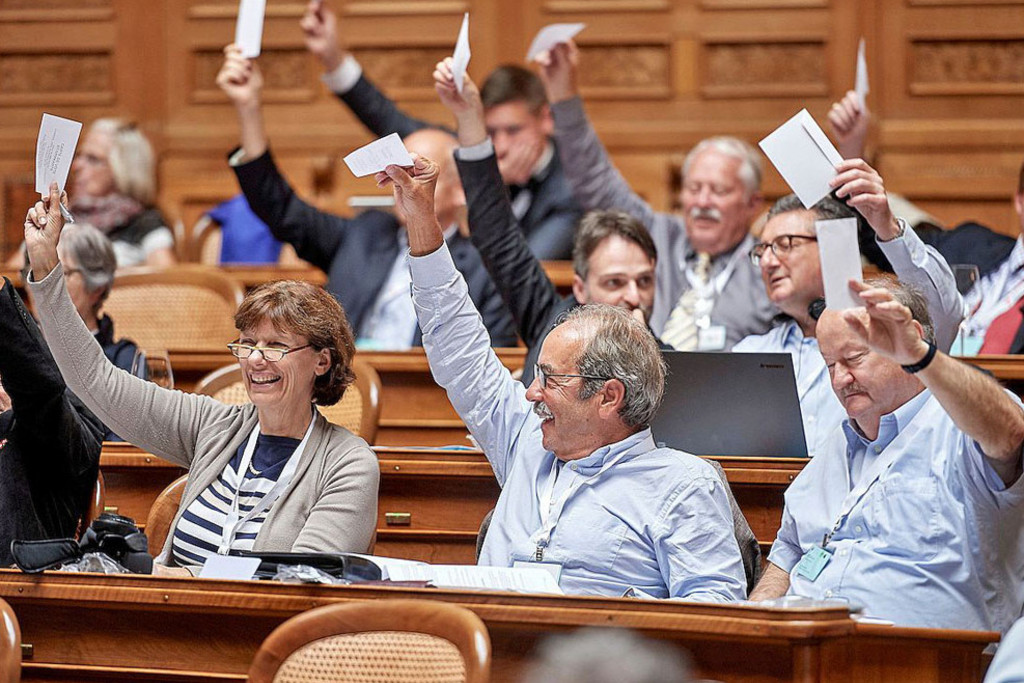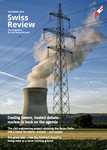Switzerland without Europe? Europe without Switzerland? Strictly speaking, neither are possible – Remo Gysin, president of the Organisation of the Swiss Abroad (OSA), made that clear right at the beginning of the plenary session of the Congress of the Swiss Abroad in Visp. Gysin said, “Neither alternative works, because Switzerland is as clearly a part of Europe as every other European country.”
The position of official Switzerland was outlined in Visp by Roberto Balzaretti, State Secretary and head of the Directorate for European Affairs of the FDFA: “To ensure the prosperity of Switzerland, relations with Europe need to be strengthened in the long term while respecting sovereignty.” He added in reference to the currently somewhat tense relations between Bern and Brussels that an agreement needs to be found in which both sides make concessions. One should not close oneself off and withdraw, but approach each other openly in order to find solutions, he said.
“Switzerland and Europe are dependent on each other more than ever. It is time to reach a joint agreement as a stable framework is in the interest of all,” was the stance taken by Michael Matthiessen, the ambassador of the European Union for Switzerland and the Principality of Liechtenstein. Matthiessen said, “The EU is Switzerland’s biggest trading partner, and if Europe is doing well, Switzerland also benefits.”
A debate in Visp highlighted just how intensively the discussion about relations with Europe is being conducted in Switzerland: the positions of Lukas Reimann, Swiss People’s Party (SVP) National Councillor and president of the Campaign for an Independent and Neutral Switzerland (AUNS), and Claude Nicati, member of the Executive Board of the New European Movement Switzerland (NEBS), in particular, were completely irreconcilable.
The directors of OSA, Ariane Rustichelli and Sarah Mastantuoni, stated in conclusion, “The topic of relations between Switzerland and Europe goes far beyond a purely European issue. It has a global dimension, not only because of the consequences for Switzerland, but also because of the impact on domestic and foreign policy and the economy.”
Switzerland’s relations with Europe were also central to the voting positions decided by the Council of the Swiss Abroad (CSA). It declared itself against the popular initiative “Swiss law instead of foreign judges” with 78 votes to 12 (see also Votes and elections on page 10). The assessment of the CSA majority was that the Swiss Abroad would be the first to feel the negative consequences of this “Self-Determination Initiative”. Prior to the vote, National Councillor Carlo Sommargua (Swiss Social Democratic Party SP/GE) summed up the stance of the CSA majority: “This initiative calls into question Switzerland’s international involvement and puts the stability and prosperity of Switzerland at risk.”
It is possible to view proceedings at the 96th Congress of the Swiss Abroad from 10 to 12 August 2018 in Visp: the recorded live stream is available on the OSA website (www.aso.ch). The date of the next Congress of the Swiss Abroad has now been confirmed. It will take place from 16 to 18 August 2019 in Montreux under the motto: “Which world for tomorrow?”.
Ensuring Swiss Nazi victims are not forgotten
The Council of the Swiss Abroad clearly supports the idea of a memorial to Swiss victims of the Holocaust.
During the Second World War, more than 200 Swiss citizens were gassed, shot or slain in Nazi concentration camps. No single violent confrontation in the last 200 years has claimed more Swiss lives. More than 700 other Swiss citizens survived the camps, but remained marked by the consequences of the atrocities suffered there.
This fact is largely unknown. That is why the OSA is now calling for a memorial to remember the victims. During its session on 10 August 2018 at the congress in Visp, the Council of the Swiss Abroad clearly backed the demand with 120 votes in favour. There were no votes against.
OSA President Remo Gysin emphasised in the debate preceding the decision that it is right for the Swiss Abroad to have called for this overdue historical reappraisal. For them it is “particularly clear that the history of Switzerland does not end at the Swiss border”, he said.
No definite project exists at present, and financing of the hoped-for memorial has also still to be worked out. But following the clear vote in Visp, the OSA will further examine the issue and establish contact with other interested organisations.
The goal: electronic votes for everyone by 2021
The Council of the Swiss Abroad has reacted to the growing criticism surrounding electronic voting by launching a petition. E-voting is the only way to guarantee all Swiss Abroad their political rights, according to the CSA.
Some 172,100 Swiss living abroad are listed in an electoral register and can thus vote and take part in elections in Switzerland. But often the wish to exercise these political rights remains unfulfilled: voting documents frequently arrive too late, and eligible voters living far from their homeland often cannot take part in votes or elections.
Now the Swiss Abroad are bringing more pressure to bear in this area. At the session of the Council of the Swiss Abroad that took place on 10 August 2018 in Visp, delegates from around the world decided to launch the online petition proposed by the OSA and to call for the rapid development of an electronic voting and election platform. E-voting is ultimately the only way that guarantees that the Swiss living abroad can exercise their political rights, a number of delegates pointed out.
The petition, addressed to the Federal Council and parliament, specifically calls for e-voting to be made possible for all Swiss Abroad by 2021. To lend weight to its demand, the OSA is hoping for 10,000 signatures. The petition can be signed online until 28 November 2018 (see link at the end of article). Immediately after the collection deadline – on 30 November 2018 – it will be submitted to the Federal Chancellery.
www.evoting2021.ch











Comments
Comments :
Der zweite Punkt ist die Annahme der Personenfreizügigkeit.
Und jetzt wird die SCHWEIZ seine wahre Demokratie verlieren und von der EU langsam überfahren.